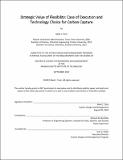Strategic Value of Flexibility: Case of Execution and Technology Choice for Carbon Capture
Author(s)
Tozzi, Mark J.
DownloadThesis PDF (3.156Mb)
Advisor
de Neufville, Richard
Terms of use
Metadata
Show full item recordAbstract
This thesis addresses the strategic issue of how best to develop large-scale investments in carbon capture and storage (CCS). It compares flexible designs with real options for execution and technology choice, to fixed investments associated with a proposed CCS ‘hub’. Climate change and global aspirations to reduce CO2 emissions are generating increasing interest in accelerating investment in CCS. This thesis focuses on how to value and frame development of one of the world’s largest proposed CCS hubs in the Gulf Coast industrial corridor.
Flexibility in design and real options analysis were applied to this proposed hub, as a case study, to demonstrate that progressive technology investment and pilot-based capture deployments with scale optionality, generate the best project outcomes across the wide range of policy and commercial uncertainties impacting CCS development. Through system decomposition, the proposed hub was modeled as a dynamic techno-economic system. Monte-Carlo simulation and multi-dimensional project evaluations were performed for a range of potential scenarios.
Results of this analysis indicate that a flexible strategy that deploys capacity as policy and technology improve, and scales capacity as costs decline, is preferable to large-scale, fixed investments in a CCS hub. This flexible, conditions-based approach to development mitigates the extent and probability of downside outcomes, de-risks sensitive capture costs, and enables value-accretive scaling – all while achieving similarly high cumulative volumes of CO2 captured.
The intent of this effort was to illustrate the high-level tradeoffs and opportunities within CCS development through creation and use of a screening model. This front-end modeling approach to strategy development is recommended in the early stages of CCS (or analog) projects, where identification and implementation of flexibility and real options can yield the largest value to the prospective project opportunity. Model assumptions and results are intended to be notional in nature and not for investment or decision-making purposes. Future work could focus on improving the accuracy of the model parameters and relationships to reconfirm insights with project-specific data, as well as further test these recommendations through extension to analog cases supporting decarbonization.
Date issued
2022-09Department
System Design and Management Program.Publisher
Massachusetts Institute of Technology